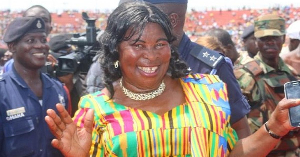
Akua Donkor, the trailblazing founder and leader of the Ghana Freedom Party (GFP), passed away at Ridge Hospital in Accra.
Known for her charismatic and determined spirit, Akua Donkor built a name in Ghanaian politics by fighting passionately for the rights of the rural poor and marginalized, often challenging traditional political norms and bringing unique, bold ideas to national discourse.
Early Life and Humble Beginnings
Born in February 1952 in Afigya Kwabre District in Ghana’s Ashanti Region, Akua Donkor grew up working as a cocoa farmer.
Without formal education, she carved her way into public service, eventually becoming an assemblywoman in Herman, a community role that enabled her to advocate for local issues.
Her modest upbringing and hands-on experience in agriculture shaped her lifelong dedication to issues affecting rural communities.
Rise in Politics and Formation of the Ghana Freedom Party
In 2012, Donkor founded the Ghana Freedom Party (GFP) with a goal that seemed audacious to many: becoming Ghana’s first female president.
Although she faced significant challenges, including repeated disqualification by the Electoral Commission in 2012 and 2016 for not meeting certain requirements, Donkor persisted, gaining attention for her outspoken style.
She maintained that her efforts were a stepping stone toward achieving her ultimate dream.
Despite disqualifications, she still encouraged people to call her “Her Excellency,” reflecting her belief in her destiny to lead the nation.
Advocacy for Farmers, Women, and Youth
Throughout her political journey, Akua Donkor championed the welfare of farmers, often criticizing government policies she believed neglected small-scale agriculture.
Her platform included ambitious promises such as supporting local production by refining Ghana’s oil and harnessing natural resources like gold and cocoa to benefit citizens.
Donkor’s focus on women’s issues also distinguished her, with proposals that included extended maternity leave and soft-loan provisions to support women-owned businesses.
She even advocated for the release of imprisoned women who had defaulted on loans, offering them a fresh start with new loans and a three-year grace period to repay.
Bold Campaign Promises
Donkor’s vision for Ghana was transformative and unapologetically progressive. She promised free education from primary to secondary school, eliminating import taxes to stimulate trade, and creating a free trade zone at Tema Port to attract international businesses.
Inspired by her political icon, the late Libyan leader Muammar Gaddafi, Donkor believed in Ghana’s potential to compete with other African nations in terms of economic strength and self-sufficiency.
A Strong Stance on Social Issues
Akua Donkor was known for her stance on cultural issues, notably her opposition to LGBTQ+ rights, which she asserted were against Ghanaian cultural values.
Her views sparked both controversy and dialogue, reflecting her unwavering position on issues she believed were integral to Ghana’s social fabric.
Akua Donkor’s political journey, though fraught with setbacks, highlighted her resilience and unwavering commitment to her cause.
In 2020, she once again made history as one of three women cleared to contest the presidential elections, finishing fifth out of 12 candidates.
In 2024, she entered the race once more, undeterred by past challenges. Her journey, from a cocoa farmer with no formal education to a prominent voice in Ghanaian politics, leaves an indelible mark on the country.
Her life story will continue to inspire many as a testament to the power of determination and the pursuit of dreams against all odds.
As Ghana mourns her passing, Akua Donkor’s legacy as a champion of the poor, the marginalized, and Ghana’s rural communities lives on, embodying the strength and tenacity of an extraordinary woman who fought for her place on the political stage.